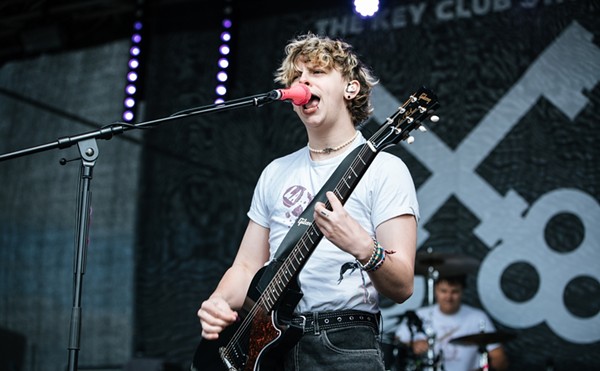Randy Jackson tends to be the only helpful American Idol judge. While Paula Abdul mumbles useless bonbons such as “You looked like you were having fun out there,” and Simon Cowell plays the bitchy bad cop, Jackson assumes the role of motivational coach. But after Haley Scarnato labored her way through a none-too-spicy take on Vicki Sue Robinson’s salsa-disco thumper “Turn The Beat Around” on Idol’s April 10 “Latin Week” show, Jackson curtly dismissed her performances as being “very karaoke.”
The observation, while accurate, seemed odd in the context of Idol. It was a bit like accusing Peyton Manning of being “too football-y” or Katie Couric of being “excessively news-anchor-y.”
What is, Idol, after all, if not the world’s most crowded karaoke bar? This is a show built on the survival techniques of the karaoke world: melodramatic phrasing, superfluous melismas, and inappropriate displays of vibrato. Less is never more on Idol. If you go for the histrionic, you run the risk that Cowell will accuse you of shrieking. But if you opt for the understated, you’ll almost certainly disappear in a hurry.
It’s been fascinating, and fairly amusing, to follow this season’s conventional wisdom (if the word “wisdom” can ever be attached to a show hosted by Ryan Seacrest) . Sanjaya Malakar was quickly branded an effeminate, tone-deaf, pony-hawked joke, surviving only because Howard Stern wanted to monkey-wrench the show’s voting process by helping the most inept singer win. It was reminiscent of the Democrats who voted for Pat Buchanan in 1992 Republican primaries, just to embarrass the GOP.
Scarnato was soon cast as the show’s designated hoochie mama, covering her vocal inadequacies while shamelessly revealing her million-dollar gams. When Cowell critiqued her Latin-Week performance by suggesting that she “wear the least amount of clothing possible,” he sounded like Sharon Tate’s mom in Valley of the Dolls, constantly reminding her daughter that she had no talent, so she’d better exploit her hot body.
Truth be told, Scarnato and Malakar are no better or worse than most of Idol’s contestants. Both of them have a sweet tooth for schlock and a perpetual giddiness that can be a little disorienting. And neither of them has demonstrated the slightest inkling about how to interpret a song. But when did Kelly Clarkson ever wow you with her incisive treatment of a lyric?
A telling moment on this year’s Idol came during Week Seven, when Tony Bennett tutored the competitors on how to handle a pop standard. While Scarnato rehearsed Fats Waller’s “Ain’t Misbehavin’” with piano accompaniment, she coyly sang “saving all my love for you ... and you, and you.” The extra “and you’s” were clearly meant as a flirty, vote-for-me gesture to the home audience, but Bennett was not impressed. As he firmly but politely explained to her, the song tells the story of a person willing to give up all their past mischievous behavior and dedicate themselves to their loved one. Scarnato’s ad-lib, Bennett said, made no sense and “destroyed the meaning of the song.”
Such thoughts never to seem to enter the heads of Idol competitors, who feel compelled to belt every line like they’re auditioning for the Ethel Merman Story. This is the post-Mariah Carey school of pop singing, passed down to Christina Aguilera, and imitated by countless, anonymous inferiors. In this world, understatement is for losers, and irony is something you pump at the gym.
If Idol performances are irony deficient, the same can’t be said for the show’s selection of mentors. Has it escaped viewers’ attention that two of the last three celebrity guests, Gwen Stefani and Jennifer Lopez, would have been laughed off the show if they’d tested their pipes in front of the snippy Cowell?
But why stop with Stefani and Lopez? Consider the ridicule that would have been heaped on some genuine legends: Roy Orbison would have been dismissed as a bug-eyed whiner who sang like a bowling-alley Maria Callas; Billie Holiday would have been mocked for croaking like a melancholy frog; Patti Smith would have been encouraged to take a bath and go back to working in a piss factory; and Jimi Hendrix would have never made it out of the first round.
The obvious point is that Idol’s structure can’t accommodate expression or originality, it’s all about creating stars. It’s not designed for artists burning with something to say, it’s designed for performers burning to be discovered. It’s telling that Jennifer Hudson, the most dynamic talent to emerge from the show’s first six seasons, summarily got the Idol boot.
While Cowell and Co. didn’t have the power to send Scarnato packing, their repetitive jabs at her “cabaret” tendencies and “pageanty” delivery surely affected the voting public. Like Malakar, she was ultimately viewed as a dubious talent, and unlike Malakar, she didn’t benefit from the anti-Idol prankster vote. All along, she was a safe, compromise choice, which allowed her to skate by for several weeks, but ultimately kept her from advancing to the final rounds.
Through it all, her wedding-singer roots with the Oh So Good Band shone through. She took Cowell’s needling with a beauty-pageant smile and returned the following week with bigger determination and shorter shorts. The show has lost its sex symbol, but San Antonio has regained its most famous wedding singer.

















